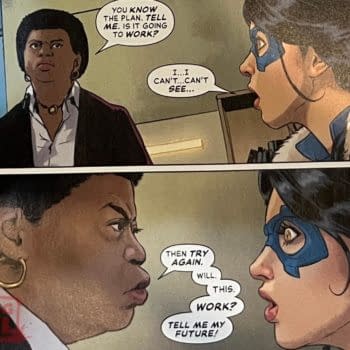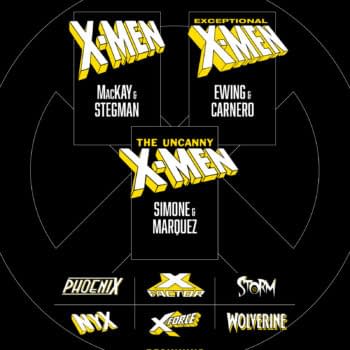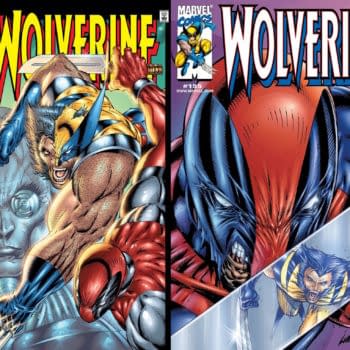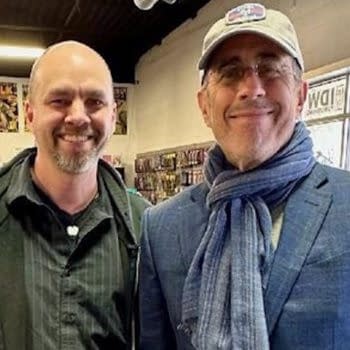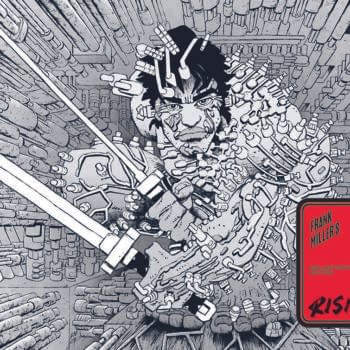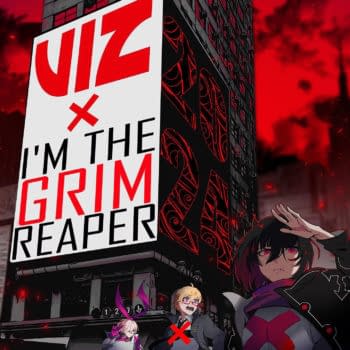Posted in: Comics | Tagged: Comics, Doctor Spektor, dynamite, entertainment, Gold Key, joe casey, mark waid
"I Liked The Opportunity Of Rethinking A Character Without Risking Being Compared To Jim Shooter…" – Mark Waid Talks Doctor Spektor
Mark Waid has worked all sides of the comic industry: editor, writer, retailers… so when fellow writer Joe Casey (Captain Victory and the Galactic Rangers) was asked to interview him about Doctor Spektor, Joe couldn't resist asking him about everything… including a bit about DC's New 52.

MARK WAID: There's a whole corner full of twenty long boxes. They're brought into us by a friend of one of the co-owners who has them on consignment, and he rotates a new supply in every couple of weeks, near as I can tell. There's no rhyme or reason to the system, but even I find stuff every once in a while. If you had asked me on pain of death whether or not my store had any copies of THE MAZE AGENCY before I went sifting through last week, I'd be dead now.
JC: Just curious, does Alter Ego stock any DC/New 52 titles?
MW: Now, now. Just because I'm not the audience for those books doesn't mean we don't have customers who want them and expect them. Even though when any of them casually says, "I love the Barry Allen FLASH," I die a little inside.
JC: Alright. Doctor Spektor. Not the most well-known of the Gold Key properties, to put it kindly. Was that part of the appeal of the gig? It's kind of a no-lose situation, creatively speaking…
MW: That was the gist of it. I liked the opportunity of rethinking a character without risking being compared to Jim Shooter or Fabian or anyone else I know personally. It was a name and a formula, and Nicky encouraged me to run with that and remake it for the 21st century.

MW: I have, if anything, gotten appreciably worse with time management over the years. Demonstrably worse. How anything gets done AT ALL is a total mystery to me, and with so many plates spinning, I cannot remember one single day this year so far where whatever it was I accomplished by sundown was even close to what I'd set out to accomplish after breakfast. Basically, whatever my morning game plan is, it goes by the wayside as the emails start rolling in and I prioritize based on whoever's yelling at me the loudest that day.
JC: These Gold Key/Dynamite books are another "shared universe" initiative (a headspace I'm decidedly NOT in when it comes to the Captain Victory book I'm writing, where it stands completely alone). My perception of you is that you're an able and willing team player. And yet, I know there's another, darker side of you which would love to carpet bomb the world around you so you could just do your own thing with no interference whatsoever. C'mon, which one is the real Mark Waid?
MW: Ha. More and more, the latter. Spektor is, in fact, part of a shared universe, but editorially it's been pretty hands-off as far as letting me define my level of participation. Something like Empire or Insufferable–that's where I can just go nuts and wingwalk. But I will say that there's an appeal to the shared-universe concept that fits in with my own writing style and personality, and it has nothing to do with fanboy love or nostalgia. It has everything to do with the fact that I love puzzles and I love problem-solving, and a blank slate doesn't automatically get my imagination racing in the same way it redlines when you tell me "I need a story using the Silver Surfer and the Savage Land" or "I want to read a comic where Superman meets the Blackhawks" or even "Give me a story that's about a matchbook, an Irish immigrant, and a shooting star" or whatever. I'm best when you give me a toehold.
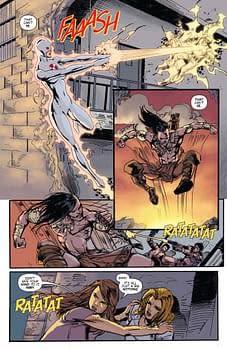
MW: Off the top of my head? Michel Fiffe. Evan Shaner. Too many to single out. But you know what really enervated me at San Diego Comicon? We did a "Pitch Your Comic To Mark Waid" Thrillbent panel. Anyone could sign up. I listened to pitches for the whole length of the panel with the promise that we'd take the best one and develop it at Thrillbent. The catch was that since I was asking for one story–not a series, not an epic–you had 15 seconds to pitch. I figured we'd have 20, 25 people.
We had nearly a hundred. And that's not the gleeful part. The gleeful part was that NOT ONE OF THOSE PITCHES WAS STUPID. There were a few that were tired. There were a few that derivative, and more than a few that were too big an idea for one short story. But there is not one chance in a billion that I could have told you before we began that a third of them wouldn't be "A vampire marries a werewolf, the end" or "A monkey punches a robot" (Ross Richie's classic go-to example of a lame pitch). Instead, dozens and dozens of ideas–all diverse, all from a gender-and-ethnically diverse group of tyros, all of whom clearly loved comics–experiencing that first-hand–oh, my God, this must have been how Superman felt when Grant Morrison had him visit the 853rd century. This is the future.
JC: So, we're all lucky enough to have Mark Waid, the writer, still banging away… but does the industry need Mark Waid, editor? I say hell-fucking-yes, but that's just me (and, of course, this is just my way of getting you to tell the story of hiring Ty Templeton for the Legion of Substitute Heroes story in Secret Origins, which is one of my favorites).
MW: I love being an editor. I hate the paperwork part, but I love being in a position to hire and to, WHEN REQUESTED, dispense the wisdom of experience because nothing makes you better at refining your own instinctive methods than having to articulate them for students. But you know my philosophy: hire good people, get the hell out of their way, and don't let your ego intrude. One of the best jobs ever out of my office was Ty Templeton's LEGION OF SUBSTITUTE HEROES origin for that SECRET ORIGINS book of the late 1980s that was my own little beachhead. I knew Ty, I knew his talent, I asked him to do a 19 page story. A month later, I got in 19 pages of lettered, inked boards ready to send to the colorist and then the printer. And my bosses went APESHIT. "These–these are already lettered! You never saw the pencils?" No. "You at least saw the script, right? Tell me you saw a script!" No. Why, would I have made it funnier? Than Ty Templeton could have? Please. If you add up all the in-office editorial production time spent on that story, 20% of it was on paperwork and 80% of it was spent explaining to everyone in the building that if you hire the right people to do their best work and relax, everyone will live longer. Most of being an editor, aside from the administrative part, is casting. Hire people who solve more problems than they could ever create.
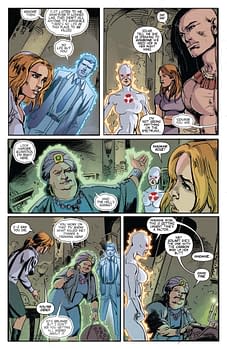
MW: That anecdote goes a long way towards hitting the overall gestalt, but not in a negative way. Yes, there were some nervous people up there, but DC office culture in the late 1980s was defined by Dick Giordano, Executive Editor and the all-time master of knowing just how much rope to give to creators and staffers. Controlled chaos. Lightly managed mayhem. The last great era of taking chances first and sweating the P&L sheets later. If you were an editor, as long as your book sold and passed the Comics Code, you were pretty much left alone. No one said to you, "your book isn't budgeted for a Kevin Nowlan story" or "This cover sketch has to be approved by a committee." When Brian Augustyn pitched GOTHAM BY GASLIGHT and, that same morning, we roped Mike Mignola into committing to draw it, it was approved that day. Everyone, me included, got shot down from time to time, but the overall sense of audacity and fearlessness, particularly among the younger editors, was strong and that all came from Giordano. God, how I miss him.
For more on Doctor Spektor, click here.
For more on Captain Victory And The Galactic Rangers, click here.









